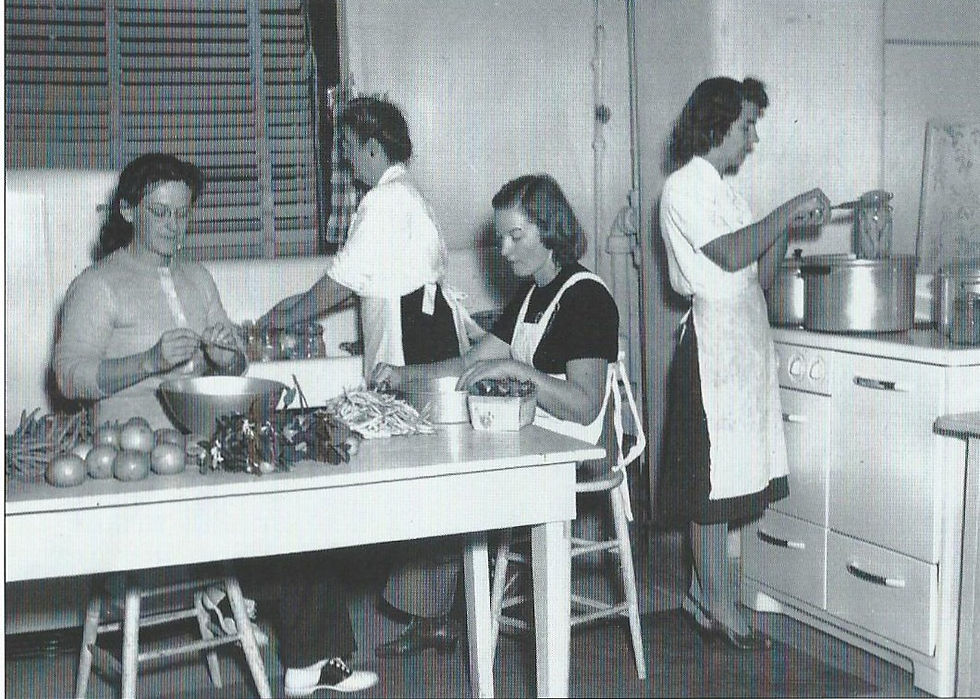Agriculture at Home Prevalent During WWII
By: Diane Ingram, Supervisor

Photo from Manatee County Historical Society (MCHS), taken by Harold R. Smith during WWII; several women “put up” produce in the Palmetto Defense Kitchen in the Palmetto Armory, doing their part to help the war effort.
During World War II, folks were encouraged to plant gardens at home to help prevent a food shortage. These backyard plots were called Victory Gardens and were abundant across the country. Being an agricultural community, it is no surprise that Manatee County’s residents jumped on the Victory Garden wagon and participated in this war effort to make sure that there was enough food for our soldiers fighting around the world. According to The National WWII Museum, at their peak there were more than 20,000,000 Victory Gardens planted across the United States. More than one million tons of vegetables were grown in Victory Gardens during the war.
But what to do with all of the produce grown here in Manatee County? Can it, of course! In The Palmetto News, February 1943, an article announced that the Defense Kitchen located at the Palmetto Armory, was now equipped and ready for the canning of fruits and vegetables. The Armory was located in the building where the current Palmetto VFW Post No. 2488 resides; 810 6th St. West, Palmetto. Established under the authority of the Department of Agriculture and the County Agricultural Extension Service, the kitchen could be used by farmers and housewives. Supervisors were trained to monitor and assist those who used the kitchen, open Mondays through Fridays. Kitchen volunteers were required to abide by the rules. Rules included understanding the equipment being used, knowledge of time tables for preparing a variety of products, plenty of helping hands, wearing aprons and hairnets. There were also rules regarding appropriate payment from farmers to the Kitchen as well as to the Emergency Fund if their produce was being canned by volunteers. Fees paid for containers, fuel, and supplies. Product was distributed on a share basis to farmers, volunteers, local organizations, as well as to the Emergency Shelf. The Emergency Shelf was accessed by “any family in the precinct definitely needing help, or in case of a crisis brought about by war or disaster.” In addition, each person who used the Defense Kitchen was required to volunteer one day each month to can for the Emergency Shelf.
After its official opening on March 6th, 1942 the Palmetto Defense Kitchen kept track of the canned product that was “put up.” Mrs. B.F. Mount, County Chairman of Food Conservation and Gardens, announced in The Palmetto News that from Opening Day through February 1, 1943, there were 20,185 total cans “put up.” January 1943 was an especially busy month. The 7,001 cans prepared consisted of 83 beans, 340 collards, 91 beef, 154 turnips, 282 kraut, and 6,051 tomatoes/juice. Local farmer Max Cohen alone provided enough tomatoes for 1,400 cans of juice and 700 cans of tomatoes. Other farmers who contributed to the Defense Kitchen whose names may sound familiar were Courtney, McLean, Harllee, and Wheeler.
Canning products locally allowed ration coupons that each family received during World War II to stretch further. Canned vegetables and meats were items that were rationed. The government introduced rationing because certain things were in short supply during the war and rationing was the only way to make sure everyone got their fair share. Victory Gardens helped support the work of local defense kitchens, ensured that families had enough food supply and they gave Americans the feeling that they were doing something helpful to win the war.

Local United States Air Force Veterans from left to right, Steve Ahern (1974-1994), Ann Marshall (1966-1986), John Hamilton (1966-1970) sit back and admire the Victory Garden they just planted at the Palmetto Historical Park & Manatee County Agricultural Museum in Palmetto.
At the Manatee County Agricultural Museum located in the Palmetto Historical Park, a Victory Garden was recently planted as part of our partnership with Legacy of Valor. Legacy of Valor is a local campaign that rallies our community to honor veterans, inspire patriotism, and pass freedom on to others. The garden was built and planted by local veterans and is currently producing lettuce, beans, black-eyed peas, squash, tomatoes, and more. Take a drive or walk through the Park at 515-10th Ave. West, Palmetto to see the garden and learn more about Victory Gardens on the signage. And while you’re in the area, take a look at the old Armory building right around the corner and imagine what it would have been like to “put up” vegetables in that building as a way of inspiring patriotism and passing freedom on to others.






















